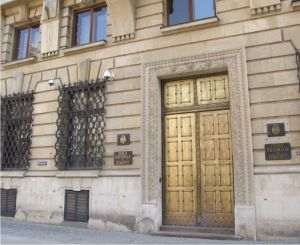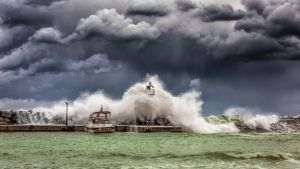Christianity has approximately 2.2 billion followers, almost one third of the population of the globe, being the largest religious community in the world.
37.5% of the total of Christians are located in the Americas (11.4% in the USA), 25.7% in Europe, 22.5% in Africa, 13.1% in Asia, 1.2% in Oceania and 0.9% in the Middle East, meaning that over 37% of the Christians on the planet are located in the two epicenters of the current financial earthquake - Europe and USA -, where they account for the majority of the population (an observation which gives us the right to say that the crisis concerns mostly the Christian finance).
The Eastern Orthodox Church has about 300 million followers, and the Roman-Catholic Church has about 1.2 billion.
The two documents reproduced in BURSA today - the Encyclical of the Holy Synod of the Church of Greece and the Note of the Pontifical Council for Justice and Peace of the Vatican, speaking on behalf of the Orthodox, and of the Catholic Church, respectively - are separated by a period of ten months, but also by opposite visions when it comes to the essential points, even though for the most part they make similar statements on the importance of spiritual life.
The crossing between the two visions is marked by a disruption between the options for solving the crisis.
The Holy Synod of the Church of Greece recommends "asceticism", construed not as "deprivation of pleasure, but enriching our lives with meaning instead", and urges: "With this kind of spirit, gather round our great family, the Church, revealing our flaws, searching for the meaning of life in love, and we will endure these hard times".
The Vatican however, proposes the creation of a world Authority, which would be guided by the principle of subsidiarity: "According to the logic of subsidiarity, the Superior Authority, only offer the < < subsidium > >, meaning the assistance, when the individual players, whether they are social or financial, are intrinsically deficient in terms of their capacity, or are unable to do what is being asked of them on their own".
Had the Orthodox Encyclical not been written ten months prior to the Note from the Vatican, we might then have believed that the Church of Greece was actually reacting precisely to this solution proposed by Catholicism, when it warns "Remember that many economics experts consider that the current crisis has been manufactured, it is a crisis by which global powers with no love for people are looking to achieve control", as well as when writing "That is why we say that we are a country that has been occupied and that we are carrying out the orders of our rulers and creditors".
But, of course, this is in no way a "miraculous premonition"; instead, it stems from the differences of doctrine between the two Christian churches, caused by the Schism of 1054.
If we were to simplify the theological principles which led to the Schism to the extreme, (inexcusably so, I would say), we would have to say that from an Orthodox perspective, the supporters of the Church which is currently called the "Roman Catholic Church", changed the initial Christian Creed, in such a way that it was considered an attempt to create a hierarchy of the Holy Trinity, thus altering its homogeneity and eternal nature. This change rejected by the Eastern Orthodox Church, to such an extent that, in some cases, it even gave up on the idea of exposing its complete name of the "Catholic Orthodox Church", to avoid causing confusion (the Greek etymology of the word "catholic", is "universal"). From a catholic perspective, the Schism is nothing but an act of sectarianism, for which the Greeks are to blame, in particular the two patriarchs Photya and Mikhail.
The Orthodox Church maintains that it is led by the Jesus Christ, and that it is his "body", meaning that it rejects the notion of a hierarchy within the body of God and makes its major decisions, of a spiritual nature, through a consensus among its priestly, thus honoring the autonomy of each parish.
In contrast, the Catholic Church makes decisions at the top, which must be obeyed (not only administratively) by the entire church hierarchy.
The two forms of organization are reflected in the texts published by our paper, visions which are intended to guide the steps of man while we are at a crossroads, which is something both churches are well aware of, not only from an economic point of view, but instead coincides with a period (without any other precedent than the first centuries of the early Christianity, of the first millennium), where the religious dogma accepts something which is incompatible with it - the deep controversy, the public debate, and especially the criticism from the most important representatives of the clergy.
The very name of Christ, spelled Hristos, Cristos, Christos (or even Crestos, like he was called by Marcion, the Archbishop of Rome, who, in the early centuries, claimed that the God of the Genesis, of the Old Testament, is different than the God of Mercy, of the New Testament) is a subject of controversy, with the four aforementioned permutations of the name of Christ considered as having different meanings, which impugn on the universal nature of Redemption; it is also being debated whether the Cross had four arms or not; whether Jesus was crucified with nails or merely hung on the cross; whether he died at 33 or at 50; whether it was someone else who was crucified, and Jesus merely watched from the sidelines, meaning that he may have died at the age of 70, in the zealot resistance of Massada, and whether he perhaps left a diary written by his own hand, which may still exist, and is may be made public at the right time; whether he had a son with Mary Magdalene; whether Judas betrayed him, or, quite the contrary, was the closest to him, and his "betrayal" was exactly what Jesus himself had asked him to do; that perhaps Judas left a Scripture of his own, just like Mark may have also left a "secret" Bible of his own, (which was intended for the eyes of the select few Christians), besides the synoptic one, the so-called "abridged" version. And this is a very brief list of randomly picked topics which have been debated in the last century.
A decade which culminated with the public display in New York, in February 2007 (around the time of the Orthodox and Catholic Easter), of the alleged bones of Jesus and of his family members, an event which was broadcasted by Discovery Channel, sparking further controversy around the Resurrection, which is the cornerstone of Christianity (which refuses to acknowledge the sole material evidence of the existence of Jesus, the Turin shroud, claiming it is just a forgery of the 15h century), just like Jesus himself is being contested and called an "usurper" of John the Baptist (an improvement over the atheist demonstrations of the fact that Jesus Christ never existed).
Are these the fruit of the search for truth, or are they mostly attacks on the Christian Churches, on the Christian religion, or especially on the Christian faith?
Are these concerted attacks part of a plan?
And if they are concerted, are they concerted to coincide with the current world financial crisis?
Are both crises - that of Christianity and that of finance - part of a hidden agenda?
The coincidences favor such suspicions, and the churches do nothing to clarify such questions, in fact, they further preserve the ambiguousness of these scenarios, and attack each other, (it bears mentioning that this year, in the Italian publication "La Stampa", in the "Vatican insider" section, several articles were published discussing the fact that the Orthodox Church of Greece is exempt from taxes, accusing it of immorality).
It would probably be spectacular to finally get an answer on all these questions, which would reveal an agenda or an organization which we could blame for the undermining of our world, but, at any rate, this answer would not provide a solution to the spiritual or financial crisis, where we are not dealing with imagination, but with reality.
Perhaps the solution to the crisis lies in the aspiration to achieve "the universal good", like the Vatican claims, supporting each other and finding strength within ourselves, "guided by the spirit", like the Orthodox Church claims.
In other words, like BURSA said in the beginning of this collection of articles, the world is changing and we are the privileged generation which is causing this change to happen.
May it happen peaceably!










































